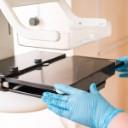-
Support Grows for Making Transfusions a Part of Hospice
Blood cancer patients have low rates of enrollment in hospice. One barrier to enrollment is that many hospices do not provide blood transfusions.
by Jon Kelvey
-
A Missed Conversation
Despite national guidelines urging oncologists to bring up risks of infertility posed by cancer treatment, many young cancer patients are never told about these risks or counseled on their fertility preservation options.
by Marcus A. Banks
-
Anal Cancer Diagnoses and Deaths Are Rising in the U.S.
Study underscores importance of early detection and prevention.
by Jane Langille
-
In It for the Long Haul
Doctors and researchers met online to discuss how the coronavirus pandemic changed cancer care in its early months, as well as how they can improve care and advocate for patients going forward.
by Kate Yandell
-
The Pandemic’s Impact on Cancer Screening and Detection
Delays in cancer screening and diagnosis due to the COVID-19 pandemic put people at risk.
by Kevin McLaughlin
-
The Return to Work
What happens if your workplace reopens before you're ready to return or you're an essential worker? For some people who have been diagnosed with cancer, accommodations may be possible.
by Jen Tota McGivney
-
Parking Costs Take a Hidden Toll on Cancer Patients
People with cancer can pay significant costs for parking at cancer centers while receiving their treatment, a study finds.
by Marcus A. Banks
-
A Modern Family
My diagnosis with colorectal cancer at age 32 affected my fertility. As a result of my experiences, I help others who have been diagnosed with cancer understand their choices related to fertility preservation and their options for becoming a parent.
by Allison Rosen
-
Treating Cancer Patients With COVID-19: A New York City Experience
An analysis of cancer patients who were infected with the coronavirus and treated at Memorial Sloan Kettering Cancer Center in New York City suggests certain risk factors may predict more severe COVID-19.
by Anna Azvolinsky
-
What is a Super Responder?
Researchers are investigating why certain patients have an exceptional response to a particular drug.
by Bradley Jones
Cancer Talk
Treatment Combination Improves Survival in EGFR-positive Lung Cancer
Adding chemotherapy to targeted therapy improves outcomes for people with advanced EGFR-positive non-small cell lung cancer.
by Sandra Gordon
Lessons From 20 Years Living With CancerMultiple myeloma survivor Jonathan Gluck reflects on uncertainty, and the scientific progress that has kept him living with cancer for more than two decades.
by Eric Fitzsimmons
The Enduring Importance of Cancer Disparities ResearchOpening session from AACR conference highlights how perseverance and adversity have informed cancer disparities research over the years.
by Eric Fitzsimmons
Most Cancer Survivors Don’t Meet Healthy Diet GoalsDespite research linking fruits and vegetables to cancer survival, many people do not change their eating habits after diagnosis.
by Darlene Dobkowski














